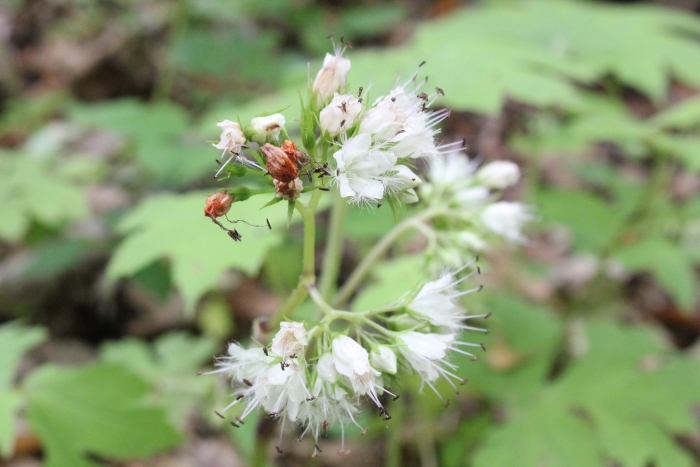Bluntleaf Waterleaf
(Hydrophyllum canadense)
Bluntleaf Waterleaf (Hydrophyllum canadense)
/
/

Quinten Wiegersma
CC BY 4.0
Image By:
Quinten Wiegersma
Recorded By:
Copyright:
CC BY 4.0
Copyright Notice:
Photo by: Quinten Wiegersma | License Type: CC BY 4.0 | License URL: http://creativecommons.org/licenses/by/4.0/ | Rights Holder: Quinten Wiegersma | Publisher: iNaturalist | Date Created: 2021-06-19T12:31:54-07:00 |



















































Estimated Native Range
Summary
Hydrophyllum canadense, commonly known as Bluntleaf Waterleaf, is a deciduous perennial herb native to rich, moist deciduous forests and floodplains in the Eastern United States and Ontario. It is one of ten species of Hydrophyllum, a genus endemic to North America. This plant typically grows to a height of 12 to 18 inches (30 to 45 centimeters) and spreads to about the same width. The Bluntleaf Waterleaf has a mounding form and is known for its coarsely toothed, basal leaves and small bell-shaped flowers that cluster on elongated stems. The flowers, which bloom in late spring to early summer, range in color from pale pink to purple and white, and are less showy than some other garden flowers but still add a delicate charm to woodland settings.
The Bluntleaf Waterleaf is valued for its ability to thrive in shady conditions, making it an excellent ground cover for woodland gardens and shaded borders. It is also appreciated for its attractive foliage and the subtle beauty of its flowers. In cultivation, it prefers part shade to full shade, consistent moisture, and well-drained soils rich in organic matter. While it is not typically used for culinary or medicinal purposes, it does support local pollinators. Gardeners should be aware that it can spread by self-seeding and may require control in smaller garden settings.CC BY-SA 4.0
The Bluntleaf Waterleaf is valued for its ability to thrive in shady conditions, making it an excellent ground cover for woodland gardens and shaded borders. It is also appreciated for its attractive foliage and the subtle beauty of its flowers. In cultivation, it prefers part shade to full shade, consistent moisture, and well-drained soils rich in organic matter. While it is not typically used for culinary or medicinal purposes, it does support local pollinators. Gardeners should be aware that it can spread by self-seeding and may require control in smaller garden settings.CC BY-SA 4.0
Plant Description
- Plant Type: Herb
- Height: 0.5-1 feet
- Width: 1-1.5 feet
- Growth Rate: Moderate
- Flower Color: White
- Flowering Season: Spring
- Leaf Retention: Deciduous
Growth Requirements
- Sun: Full Sun
- Water: Medium
- Drainage: Slow, Medium, Fast
Common Uses
Bee Garden, Bird Garden, Edible*Disclaimer: Easyscape's listed plant edibility is for informational use. Always verify the safety and proper identification of any plant before consumption., Low Maintenance
Natural Habitat
Rich, moist deciduous forests and floodplains
Other Names
Common Names: Canada Waterleaf, Broadleaf Waterleaf, Hydrophylle Du Canada, Indiankål
Scientific Names: , Hydrophyllum canadense, Hydrophyllum acerifolium, Hydrophyllum lobatum,
GBIF Accepted Name: Hydrophyllum canadense L.